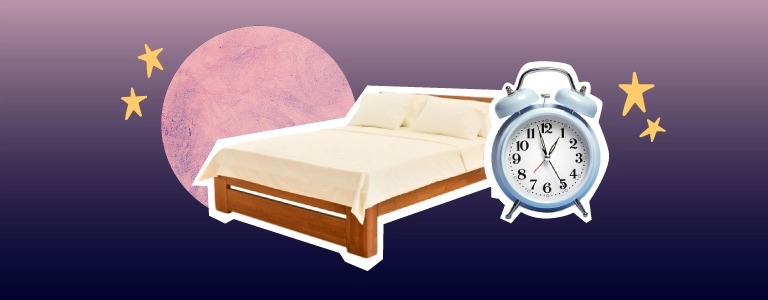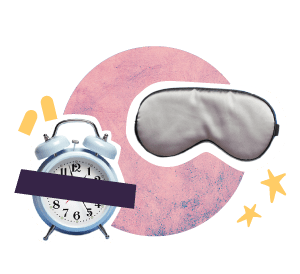A Sleep Hygiene Guide for Shift Work

Shift workers are vital to many industries, but working unconventional hours can be challenging, as Meghan Bonnar, RN, who works night shifts in the intensive care unit, can attest.
“Nursing in and of itself has unconventional hours because we work 12-hour shifts,” Bonnar said. “[Working night shifts] is really hard. Some people can find a balance in it, and other people cannot.”
Kelsi Burke, RN, BSN, also works as a night nurse and has found some benefits to her work schedule. “I see my kids and family more because I’m there when they leave [in the morning] and when they come home.” Burke said. “If I worked day shifts, [my children] would be asleep when I left for a shift and when I got home from work.”
Despite the challenge of adjusting one’s sleep schedule and working late while others rest, shift workers can find solutions that help them maintain sleep habits that benefit their health and their work.
“You have to find a routine that is good for you,” Burke said. “It takes time but you will find your rhythm.”
The Importance of Sleep Hygiene for Shift Workers
Approximately 25 percent of people in the United States work evenings, nights, early mornings or rotating shifts. This includes nurses and other health care professionals in certain settings, as well as other industries, including hospitality, food service, security and travel.
When not managed properly, the strain of shift work can affect an individual’s health in a number of ways.
“Effective sleep hygiene is vital to many aspects of physical and mental health,” said Dr. Tamara Goldsby, Ph.D., clinical research psychologist.
25% of people in the United States work evenings, nights, early mornings or rotating shifts.
“Sleep deprivation may affect cognition, psychomotor processes, memory and various aspects of health. … [Lack of sleep] has also been linked to changes in cortisol—the ‘stress hormone’—and may increase risk for impaired mood, impaired emotion regulation and depression.”
Fluctuation sleep schedules due to shift work can also lead to shift work sleep disorder, in which the disruption of circadian rhythms leads to problems with insomnia and less restful sleep. Experiencing regular sleep disruptions can then lead to a variety of issues.
A shift worker’s lack of sleep can also put others at risk, as it can lead to injuries and on-the-job errors. For example, research has shown that sleep deprivation among nurses can be linked to patient outcomes.
How Can Shift Workers Stay Healthy?
Changing your natural sleep schedule to accommodate shift work can upset the balance of circadian rhythms, the body’s internal clock that cues hunger, sleepiness and other behaviors, according to a study on circadian rhythm sleep disorders. However, there are a number of things shift workers can do to sleep more effectively and maintain their health.

How Shift Workers Can Create an Ideal Sleep Environment
Typically, people sleep when it is dark and wake up when it is light. Shift workers can create a bedroom environment that mimics these cues for sleep. Ideally, a sleep area should be dark, cool and quiet, as research has shown that these three components are important for optimal sleep.
Solutions for sleeping during the day include:
- Installing black out curtains on all windows in the space
- Wearing a sleeping mask
- Utilizing earplugs to block out sound
- Turning on a white noise machine
- Covering up your alarm clock and any other devices that emit blue light
- Silencing cell phones to avoid disturbance from notifications
Sources:
Tips for Shift Workers: How To Get Better Sleep
Sleep Tips for Night Shift Workers
23 Evidence-Based Sleep Tips

Healthy Sleep Habits for Shift Work
In addition to adjusting your bedroom to minimize disruptions, there are many sleep habits that can help people wind down before bedtime and feel more alert during waking hours.
Get into a routine. Having a standard bedtime, a workout schedule and established times for meals can help regulate the body so it knows when it’s time to sleep and when it’s time to wake up.
Find the right time to exercise. Timing for exercise can vary from person to person. Some people struggle to sleep when they exercise after their shift and closer to bedtime; others may not enjoy working out when they first wake up if it makes them feel tired before their shift starts.
Make smart food and snack choices. Eating close to bedtime can affect the quality of sleep.
A few tips include:
- Eliminate caffeine intake four to six hours before bedtime.
- Avoid alcohol close to when you plan on going to sleep. While having a drink may help you feel relaxed, the metabolization process can cause disruptions in sleep.
- Finish eating (including snacks) about two hours before going to bed.
- Avoid dairy near bedtime to avoid nasal cavity congestion and breathing issues while sleeping.
- Skip spicy food, which can cause sleep disturbances due to digestion issues.
Sources:
Sleep Tips for Night Shift Workers
How To Get Better Sleep as a Night Shift Nurse
23 Evidence-Based Sleep Tips
Mindfulness Exercises for Shift Workers
Practicing mindfulness is another way shift workers can manage stress and wind down before it’s time to go to sleep. The following exercises can be practiced in bed right before lights out.
Diaphragmatic (Belly) Breathing
- While lying down, place one hand on your upper chest and the other hand below your rib cage.
- Breathe in through the nose, feeling your stomach push up against your hand. Keep your chest as still as possible.
- Tighten your abdominal muscles and exhale through your mouth with your lips in a whistling position.
- Repeat breathing in and out to release stress and reach a state of relaxation.
Body Scan
- Take a few deep breaths to start.
- Begin to take notice of your body one part at a time.
- Notice your feet, including any sensations or tension in your muscles.
- Acknowledge any discomfort and try to let go. Visualize tension leaving your body.
- Next, move your focus to your calf muscles, repeating the process of noticing sensations, letting go, and visualizing the tension leaving the muscles.
- Continue this process throughout the body until you reach your forehead, completing the scan of your entire body.
Sources:
The Ultimate Guide to Mindfulness for Sleep
Relaxation Exercises to Help Fall Asleep
Frequently Asked Questions About Sleep Hygiene for Shift Workers
What is shift workers syndrome?
Shift workers syndrome, also referred to as shift work sleep disorder, is a circadian rhythm sleep disorder related to working long or irregular hours. Symptoms can include insomnia and excessive sleepiness.
Can night shift cause health problems?
Shift work is associated with a number of health conditions, including type 2 diabetes, heart disease, stroke, metabolic disorders, cancer and sleep disorders. Night shift work may also cause digestive problems and mental health issues. Fatigue associated with night shift can also lead to higher risk for injuries and vehicle crashes. However, practicing good sleep hygiene can help mitigate some health risks associated with shift work.
Can night shift cause weight gain?
Some night shift workers may experience weight gain due to working nontraditional hours. Adjusting your sleep schedule to contradict your natural body clock can be difficult. Sleep interruptions, in turn, can affect levels of fatty acids, cortisol (a stress hormone) and blood glucose. The shift in schedule may also affect your appetite. This can be addressed by developing healthy sleep habits and incorporating exercise into your schedule.
Can night shift cause depression?
Research has shown that shift workers may be more likely to have depression than those working a traditional schedule. While the connection is unknown, it may in part be due to disrupted sleep in cases where shift workers have trouble adjusting to a new schedule. Individuals who are experiencing feelings of depression or difficulty sleeping should consult with a health care professional.
Can night shift cause anxiety?
Shift workers can be at risk for anxiety, which can be triggered due to high stress and sleep deprivation. Because of this, it’s important for shift workers to develop healthy sleep habits and to contact their health care provider if they are experiencing issues with sleep or feelings of anxiety.
When should night shift workers exercise?
This can depend on the individual and how they are affected by exercise. Some may get a boost of energy after exercising, making it ideal to fit in a workout before a shift. Others may feel tired after exercise, and choose to work out after a shift. Some shift workers may also prefer to work out on their days off.
When should night shift workers eat?
This can depend on the individual, but generally, it is helpful to eat a meal before your shift, allow for snacks when possible, and have a small meal during your “lunch” break. When eating after a shift, food consumption should stop about two hours before bedtime.
Can melatonin help you sleep?
Melatonin supplements can be helpful as a sleep aid for some people. It is recommended that individuals only use melatonin regularly for one to two months, after which different approaches may need to be explored. It is also important to make sure the supplement is safe for use based on your existing health conditions. For example, it is not recommended for people who have an autoimmune disorder, seizure disorder or depression. Additionally, the potential effects of melatonin on those who are pregnant are unknown. Check with your health care provider before trying supplements.
Are magnesium tablets good for sleep?
While low magnesium levels are associated with poor sleep, magnesium supplements may or may not help as a sleep aid. Taking too much magnesium can have negative health effects, such as diarrhea or cramping. Consult with a health care provider before adding magnesium supplements to your diet.
Is doxylamine succinate a good sleep aid?
Doxylamine succinate is a sedating antihistamine that can be used as a short-term sleep aid. However, it is not recommended for long-term use, and can be potentially harmful for people with certain health conditions, including asthma, sleep apnea, and severe liver disease. Consult with a health care professional before using this sleep aid.
Is doxylamine succinate safe during pregnancy?
Doxylamine succinate can be safe to use during pregnancy when taken as advised by a health care professional. Check with your provider before using doxylamine succinate as a sleep aid.
Sources:
- Shift Work Disorder Symptoms
- Recent News about Night Shift Work and Cancer: What Does it Mean for Workers?
- Shift Work and Poor Mental Health: A Meta-Analysis of Longitudinal Studies
- Battling Anxiety as a Shift Worker
- Sleep Tips for Night Shift Workers
- 7 Tips for Night Shift Weight Loss
- 23 Evidence-Based Sleep Tips
- Melatonin for Sleep: Does It Work?
- Using Magnesium for Better Sleep
- Maternal safety of the delayed-release doxylamine and pyridoxine combination for nausea and vomiting of pregnancy; a randomized placebo controlled trial
- Clinical Update 2020: Melatonin and Pregnancy
- Are drugstore sleep aids safe?
Please note that this article is for informational purposes only. Individuals should consult their health care provider before following any of the information provided.

